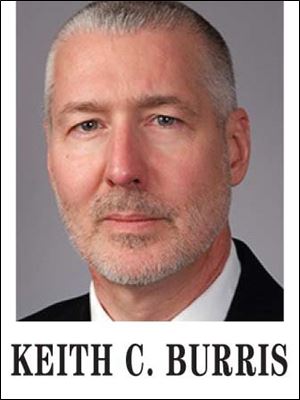
COMMENTARY
Local antidote to racism is practical and personal action
1/5/2014
At 7 p.m. Thursday at the University of Toledo’s Nitschke Auditorium, David J. Johns, an assistant to President Obama, will be the second speaker in the Toledo Community Coalition's ongoing public forums on combating racism in Toledo.
In his post, Mr. Johns is responsible for finding ways to broaden economic opportunity for young people of color. He is a former aide to Sens. Ted Kennedy and Tom Harkin and to the Congressional Black Caucus. He is there to act on what the President often articulates — education is the main and most effective way out of poverty in this nation. Especially, some of us are increasingly convinced, technical and what used to be called “vocational” education. Not liberal education but hands-on, highly specialized education.
We need more money for this type of schooling in the nation. And for that, we need a different sort of Congress. I expect Mr. Johns may talk about this during his Toledo visit. And more. I hope he has a list of specifics — both diagnostic and prescriptive. I know that there are not “answers” out there, but I hope there are some practical actions that most American can agree on for combating the aimlessness and violence of our urban youth; for addressing the breakdown of the American family; for doing something about the lack of jobs, good housing, and decent food in our cities.
We know that the problem of race is linked closely with poverty and class. We know that you can’t talk about race without talking about prisons or prisons without talking about race because there are twice as many young black men in prisons as young white men, and they stay longer.
But what do we do about it?
Tomorrow?
Those are the questions.
In addition to the mass-audience public lectures, co-sponsored by The Blade, the Community Coalition has been sponsoring small study groups on race, which last six weeks. I have participated in one of these. Blade Managing Editor Dave Murray, instrumental in The Blade's partnership with the coalition, participated as well.
In my study group, I heard a horrific tale of a young, black, female bank employee, some years ago, verbally harassed and demeaned by a boss. And how hard it was to right that wrong. And how the passion for right motivated that young woman.
I heard about Toledo’s race riots. And I heard my friend Pete say that if enough young men saw the film Twelve Years A Slave, there would be riots again.
I heard about how 70-some African-Americans banded together, with the help of an angel from one of Toledo’s oldest families, to buy the first minority-owned McDonald’s franchise in Toledo.
What I learned is that you have to know the whole story before you try to suggest a next step.
And I learned that real change can only happen if there are personal connections, if there is reconciliation, and if there are pragmatic, achievable ideas for reform.
I have heard some ideas that I think fit that bill: Like providing driver's education for central city kids. Or forming a study group similar to this one for white teachers in a predominantly black school — to focus on the disparity in disciplinary actions for black and white male teens.
Other ideas are not yet into focus. But everyone seems to agree that organizing or employing young men of color in something other than gangs is paramount. They need work and they need father figures. Toledo Public Schools Superintendent Romules Durant is actually doing it with his "young men and women of excellence."
Most people also agree that mentor programs work, but how to structure the programs, probably through the schools, and where to get the volunteers are major challenges.
I do think it is vital that we get beyond confrontation and complaint and that consciousness raising leads to conscientious action.
Many years ago, circa 1969 or 1970, my parents were involved in a study-group program similar to what I joined with Mr. Murray. It was called an “interracial council,” and it was for the business community.
Both the white and the black participants were brave, I think, and some paid a price with their customers. But there were not enough of either group and nothing came of the whole thing. I have often wondered why. Was it just too early?
I think partly there was simply not enough opportunity for making personal friendships, outside the group's meetings — for getting to know each other.
It never became personal, so it never became practical.
I think the two things go hand in hand. When there is personal connection and a practical plan of action, healing and progress are possible.
These study groups are a chance for blacks and whites to get to know each other. And that builds trust and opens the way to working together.
I just watched a fine film about the greatest man of the 20th or 21st century -- Nelson Mandela: Long Walk to Freedom.
His story remains almost unbelievable. And yet, it happened.
How?: Reconciliation and pragmatism. Those were his two guideposts. That's how he rolled.
And always he paved the way with the personal touch: He knew the names and birthdays of his jailer’s children. He remembered the foods and flowers the guards liked. He knew the weaknesses of his allies and the strengths of his enemies. He got to know people and he got to know the whole story before he tried to suggest a next step. He took practical action but started small. That's how you change the world.
Keith C. Burris is a columnist for The Blade.
Contact him at: kburris@theblade.com or 419-724-6266.